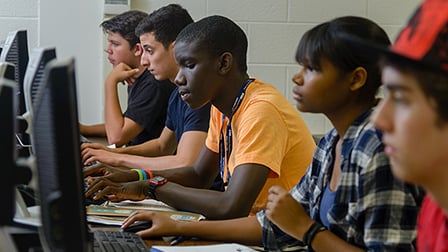 MONTGOMERY COUNTY PUBLIC SCHOOLS
MONTGOMERY COUNTY PUBLIC SCHOOLS
 MONTGOMERY COUNTY PUBLIC SCHOOLS
MONTGOMERY COUNTY PUBLIC SCHOOLS
I grew up on a farm in eastern Washington, and we had a tractor. There were maybe four things that could go wrong with it. I am not a mechanic, but I could fix most of those things.
 But that’s not the way it is any more. That machine is now mostly computer. In fact, virtually everything around us is run by a computer. Televisions. Cars. Phones.
But that’s not the way it is any more. That machine is now mostly computer. In fact, virtually everything around us is run by a computer. Televisions. Cars. Phones.
That’s why engaging with students around computational thinking is absolutely critical, starting in the earliest grades and going all the way through the 12th grade. Whether they end up working in a field that involves a lot of computer science expertise or they work in a field where they are end users of computer science expertise, we’ve still better prepared our students for the world they live in and the way they experience life.
Computer Science Education Week, held Dec. 5-11, and the Hour of Code, a one-hour introduction to coding held during Computer Science Education Week, help draw attention to computer science, and that’s important. The technology sector is among one of the fastest-growing industries in the U.S. economy, with 1.4 million new tech jobs by 2020, according to data from Level Playing Field Institute. But at the current rate universities are producing qualified graduates for these roles, 70 percent of these jobs will go unfilled.
If we were where we needed to be as a society in regards to science, technology, engineering and math, we wouldn’t need to talk about STEM. But we talk about STEM to draw attention to it because we know we need to increase the number of students who develop real expertise in these areas. The same is true of computer science.
In addition to taking these opportunities to spotlight computer science, it’s critical that computer science be integrated into education year-round. Montgomery County Public Schools has several programs and partnerships that aid in that effort. For instance, we’ve partnered with Code.org since 2014 to offer more computer science programming. That partnership emphasizes equity and diversity in its curriculum and helps us reach underrepresented groups of students in computer science classes, including females and minorities.
Three of our high schools are Microsoft IT academies and offer students the opportunity to certify as Microsoft Technology Associates in various areas. Additionally, the Information Technology Foundation, a nonprofit established by MCPS and the Montgomery County business community, promotes information technology education by helping students run a computer sales business, where they get on-the-job training that prepares them for college or a career.
We also have a vibrant offering of computer science and information technology courses for students to choose from in some middle schools and at the high school level. In fact, computer science and/or information technology is offered in 24 out of the 25 MCPS comprehensive high schools.
These partnerships and programs are important, but we must also acknowledge where we’re not giving students opportunities in this area. We need to give students more opportunities to learn about computer science in elementary and middle school so that when they get to high school, they can take better advantage of the array of the many wonderful opportunities that exist at that level, and that more students can take advantage of them.
While we’re not teaching students in elementary and middle school for their career, we are teaching them necessary foundational skills so that, when they are ready to pursue college, a career or both, they have unlimited pathways. Along with reading, writing, mathematical reasoning and computational thinking, computer science should be one of these skills. Our students are growing up in a very different world than their parents and grandparents grew up in. It is our responsibility to prepare them for this world with the skills necessary to succeed.